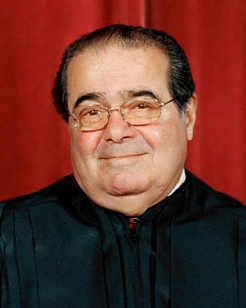
Credit: Steve Petteway, Staff Photographer of the Supreme Court
As reported around the world this weekend, Supreme Court Justice Antonin Scalia passed away of natural causes at the age of 79.
Justice Scalia, who at the time of his death was the longest serving Supreme Court justice, was the most outspoken and arguably the most influential of the conservative 5-4 majority.
His vacant seat creates a 4-4 tie of conservative and liberal leaning justices, which will have a significant impact on many major issues that the Court is set to grapple with in 2016, including abortion, immigration, and redistricting, as well as at least one major area of whistleblower law.
According to the Washington Post, Supreme Court experts agree that votes Justice Scalia would have taken on cases already argued will not count. So for the numerous cases that have been argued, but are still awaiting a published opinion, Justice Scalia’s death raises the possibility of 4-4 ties. These ties would prevent the justices from issuing a formal ruling and would uphold the lower courts’ decisions.
While some believe that we will see several affirmances-by-tie while the Senate blocks President Obama’s eventual appointee, Tom Goldstein of the SCOTUSblog has taken a different view that the ties will actually lead to reargument rather than affirmance.
Citing cases that were reargued when a justice joined the Supreme Court after having missed a case’s initial argument, Goldstein explains that:
The practice of holding reargument is important for three kinds of cases that are now pending. First, in cases in which the more liberal side won in the court of appeals…, that side will be deprived of an affirmance by an equally divided Court. It could well lose if Justice Scalia is succeeded by another conservative. Second, in cases in which the liberal side lost below and would have lost through an affirmance by an equally divided Court… it will have the opportunity to proceed before a full Court when a new appointment is made. Third…[in cases] in which an affirmance by an equally divided Court could have led to confusion because the lower court opinions were divided, there is a greater prospect that the Supreme Court will produce a single, clear decision.
The qui tam case Universal Health Services v. United States ex rel. Escobar, which will decide important issues surrounding the “implied certification” theory of falsity, is before the Court on the defendants’ appeal of the First Circuit’s decision in favor of the whistleblowers, which represents a split from other circuits.
At present, there is a split between the circuits as to whether the implied certification theory is viable. The majority recognizes some portion of the theory but applies it differently. The Fourth Circuit takes the broadest view of the theory, which is important because this is where most government contractor cases are filed given the proximity to D.C.
In that Circuit, any material breach of a contract, statute, or regulation that could be a prerequisite to payment can be the basis of whistleblower cases. Other circuits have applied the theory in a more limited fashion, requiring that there be an express prerequisite in the contract that the company comply with the provision or law in question in order to be paid.
The Seventh Circuit weighed in last year to reject the “so-called doctrine of implied false certification.” United States v. Sanford-Brown Ltd., 788 F.3d 696, 711-12 (7th Cir. 2015). This Circuit found that the action was more akin to a breach of contract than a false claim
Universal Health Services thus falls in the third category described by Mr. Goldstein above, which would benefit from a clear ruling. In cases like this, reargument makes a great deal of sense given that affirmance-by-tie would force the Supreme Court to abdicate its important role as the final arbiter of the law.
It will be interesting to see how Justice Scalia’s vacancy will be handled by the government and how it will impact all of the important cases like Universal Health Services that are pending before the Supreme Court.


